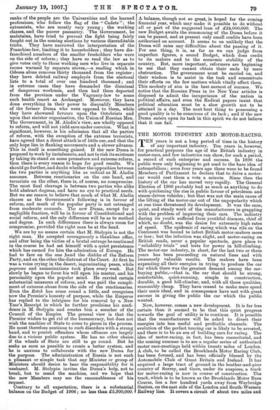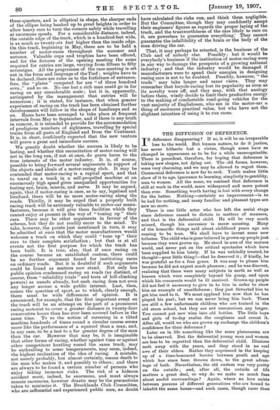THE MOTOR INDUSTRY AND MOTOR-RACING.
TEN years is not a long period of time in the history 1 • of any important industry. Ten years is, however, for practical purposes the age of the British industry in motor-cars, and few industries can show, for such a period, a record of such enterprise and success. In 1896 the public were only beginning to get used to the bare idea of automobilism ; even four years ago there were to be found Members of Parliament to declare that to drive a motor- car would cost them a vote a minute. Since then the history of the car has moved very rapidly. The General Election of 1906 probably had as much as anything to do with quickening the rise in public favour of petroleum- and steam-driven vehicles ; but that was not the main cause of the lifting of the motor-car out of the unpopularity which at one time threatened its development. It was the sane, quiet, and steady work of the manufacturers in grappling with the problem of improving their cars. The industry during its youth suffered from youthful diseases, chief of which, no doubt, was the desire for extremely high rates of speed. The epidemic of racing which was rife on the Continent was bound to infect British motor-makers more or less ; but the infection was slight, and motor-racing on British roads, never a popular spectacle, gave place to "reliability trials" and tests for power in hill-climbing. The motor-car industry, in short, for the last two or three years has been proceeding on natural lines and with immensely valuable results. The makers have been expending all their energies in trying to produce the car for which there was the greatest demand among the car- buying public,—that is, the car that should be strong, comfortable, quiet-running, simple in construction, durable, a good hill-climber, and, with all those qualities, reasonably cheap. They have ceased to make mere speed their main ideal, and in consequence have met with great success in giving the public the car which the public wanted.
Now, however, comes a new development. It is far less certain than it seemed to be that this quiet progress towards the goal of utility is to continue. It is possible that the manufacturers will be asked to divert their energies into less useful and profitable channels. The evolution of the perfect touring car is likely to be arrested, and there is to be an era of building cars for racing. The idea of motor-racing, in fact, has been resuscitated, and the coming summer is to see a regular series of authorised motor race-meetings held within twenty miles of London. A club, to be called the Brooklands Motor Racing Club, has been formed, and has been officially blessed by the Automobile Club of Great Britain and Ireland. It has acquired a large tract of ground in the heather-and-pine country of Surrey, and there, under its auspices, a track for motor-racing is now in course of construction. The track, which is to be known as the Brooklands Motor Race Course, lies a few hundred yards away from Weybridge Station, on the east side of the London and South-Western Railway line. It covers a circuit of about two miles and three-quarters, and is elliptical in shape, the sharper ends of the ellipse being banked up to great heights in order to allow heavy cars to turn the corners safely while travelling at enormous speeds. For a considerable distance, indeed, the outside edge of the track, which is a hundred feet wide, is as much as twenty-six feet higher than the inside edge. On this track, beginning in May, there are to be held a number of motor-races throughout the summer and autumn. Valuable cups and trophies have been offered, and for the fixtures of the opening meeting the sums required for entries are large, varying from fifteen to fifty sovereigns. All the programme of the race-meeting is set out in the form and language of the Turf ; weights have to be declared, there are rules as to the forfeiture of entrance- fees, the " plates " competed for are "of three hundred soya.," and so on. No one but a rich man could go in for racing on any considerable scale ; but it is, apparently, anticipated by the management that entries will be numerous ; it is stated, for instance, that when greater experience of racing on the track has been obtained further developments will follow in the shape of handicaps and so on. Races have been arranged to take place at frequent intervals from May to September, and if there is any truth in rumour, it is intended to provide for the accommodation of prodigious numbers of sightseers, travelling by special trains from all parts of England and from the Continent. It is, in short, confidently expected that the new venture will prove a great and immediate success.
We greatly doubt whether the success is likely to be lasting, and whether this resuscitation of motor-racing will not in the long run, if not at once, do grave harm to the true interests of the motor industry. It is, of course, possible to bring forward several arguments in support of the objects and ideals of a motor-racing club. It may be contended that motor-racing is a capital sport, and that to travel on a track in a self-propelled machine at an enormously high speed gives unequalled opportunities for testing eye, brain, muscle, and nerve. It may be argued, again, that if motor-racing is once, so to say, legalised and localised, there will be no more motor-racing along the roads. Thirdly, it may be urged that a properly built racing track will be extremely valuable to motor-car manu- facturers, because it will give them facilities which they cannot enjoy at present in the way of " tuning up " their cars. There may be other arguments in favour of the scheme, but they do not readily occur to the mind. To take, however, the points just mentioned in turn, it may be admitted at once that the motor manufacturers would welcome a track on which they could "tune up" their cars to their complete satisfaction ; but that is at all events not the first purpose for which the track has been built. It is true, also, that if once racing on the course became an established custom, there could be no further argument found for instituting races on ordinary roads. But it is doubtful if such arguments could be found as matters now stand. Not only has public opinion condemned racing on roads (as distinct, of course, from "reliability trials" and tests of hill-climbing powers) as unsafe already, but such racing does not even any longer arouse a wide public interest. Last, then, comes the question of sport, as to which, clearly enough, there must be wide differences of opinion. It is announced, for example, that the first important event on the track will be an attempt on the part of a prominent racing motorist to cover a greater distance in twenty-four consecutive hours than has ever been covered before in the same time. To us the notion of careering in a tilted machine hundreds of times round a circular course seems more like the performance of a squirrel than a man, and, in any case, to be a test to a far greater degree of the man than the car. However that may be, it is imaginable that other forms of racing, whether against time or against other competitors hurtling round the same track, may be enthralling to some temperaments, may seem, indeed, the highest realisation of the idea of racing. A mistake, not merely probably, but almost certainly, means death to the man who makes it, and possibly to others ; and there are always to be found a certain number of persons who enjoy taking immense risks. The risk of a hideous accident must, indeed, be enormous, and must always remain enormous, however drastic may be the precautions taken to minimise it. The Brooklands Club Committee, who are influential and experienced public men, no doubt have calculated the risks run, and think them negligible. But the Committee, though they may confidently accept their engineers' figures as regards the proper laying of the track, and the trustworthiness of the ears likely to race on it, are powerless to guarantee everything: They cannot guarantee the infallibility of the brain or the body of the man driving the car.
That, it may perhaps be retorted, is the business of the Club and of nobody else. Possibly ; but it would be everybody's business if the institution of motor-racing were in any way to damage the prospects of a growing national industry ; and that the industry would be damaged if manufacturers were toepend their energies in designing racing cars is not to be doubted. Possibly, however, " the trade" may take longer and saner views. They may remember that bicycle-racing lost its popularity as soon as its novelty wore off, and they may, with that analogy before them, wisely decide to limit their, productive energy to the making of comfortable road-going vehicles for the vast majority of Englishmen, who see in the motor-car a thing of enormous practical value, but who have not the slightest intention of using it to run races.







































 Previous page
Previous page